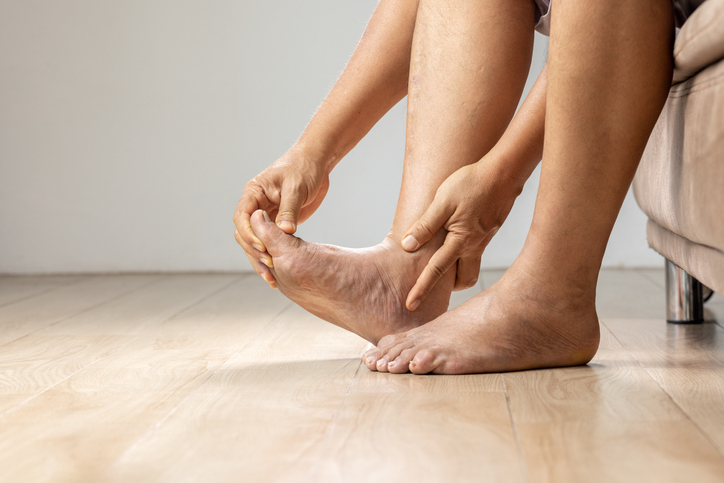Towards the end of his life, suffering from culminating decades of decadence and subsequent ill health, Benjamin Franklin penned a humorous dialogue between himself and a personified interpretation of the source of all his ills: gout. Gout, taking the personality of a scolding schoolmarm, chastises Franklin for his indulgence and sedentary lifestyle, pointing out that he ‘ate and drank too freely, and too much indulged those legs of yours in their indolence’.
Britain’s welfare state today supports more weight than George IV’s trouser braces
Gout had a reputation for being the disease of kings, a form of arthritis largely caused by a diet only achievable in past eras by the wealthiest and most culinarily liberal members of society. It produces a swelling and pain so unbearable that it often rendered its historical sufferers immobile. But it now seems to be a plague of the poor.
Much like large televisions and Range Rovers, what used to be viewed as something only available to the wealthy has now appears to be becoming the preserve of the less fortunate parts of our society. In contemporary Britain, gout has shed its aristocratic cloak and instead is wrapping itself around the shoulders of the working class. A study last year found that socioeconomic factors correlate with the existence of gout: a high level of educational achievement appears to exhibit a protective effect against gout, while lifestyle factors such as a high level of drinking and time spent watching television are casual risk factors associated with the disease.
The Lancet, the world’s foremost medical journal, published a study in 2023 showing that the prevalence of gout in England increased from 3.07 per cent of the population to 3.21 per cent in only the seven years up to 2023. The journal also highlighted, at the end of last year, that the number of people suffering from gout globally is predicted to increase by 70 per cent over the next 25 years. Clearly something important is amiss if a disease often viewed as Victorian is peaking in its prevalence and predicted to rise in the coming years.
One study published at the end of November evaluating trends of gout globally found that its prevalence among the elderly was increasing by over 1 per cent each year. This was most common in high-income regions with stark wealth divides, such as North America and Australasia.
That gout has become more common might owe something to our slide into sedentary lifestyles. In Britain, we’re a nation glued to our screens, in our working lives and our free time. A survey by MailOnline found that people on average spend nine hours per day sitting down (and that’s not just MailOnline readers). Three quarters of respondents suffered from joint pain as a result. Those without the luxury of much free time due to work, childcare, and poor health are much more predisposed to this affliction.
Pair this sedentary lifestyle with the modern diets of a time-and cash-poor populace – cheap, ultra-processed foods, takeaways, frequent alcohol consumption – and gout finds fertile grounds to develop. While the gout-afflicted of centuries past may have contributed to their suffering by way of fine wine, game and sweetbreads, today’s sufferer is more likely to pair a frozen pizza in front of the television with a glass of Chateau Poubelle. Other afflictions which are more common amongst the poorer sections of society, such as diabetes, obesity, and high blood pressure, all compound the uric acid buildup that causes gout.
There was a time when gout was viewed as an affliction only the crème de la crème of society suffered from. King George IV, renowned in his regency for his rakish excess, was one such individual; by the time of his coronation in 1820, it is said that his waist measured 55 inches and his stomach could touch his knees. Sir David Wilkie, upon being commissioned to paint a portrait of the King in the year before his death, remarked that he resembled a ‘great sausage stuffed into the covering’. The gout in his right arm was so severe that he was unable to sign documents.
Four centuries before Piero di Cosimo de’ Medici was the de facto ruler of Florence. Often referred to as Piero the Gouty, his malady left him bedridden to the extent that the Medici Palace became the official seat of the Florentine government. Largely caused by a diet rich in purines, a compound most commonly found in offal, red meat, alcohol and fatty fish, Piero was incapacitated for much of his five-year rule, having to be carried to engagements in his bedding. One wonders if the unofficial title of his son and successor, Lorenzo the Magnificent, was merely a matter of juxtaposition.
How times have changed. In previous generations, working-class men undertook largely manual forms of work, with a hearty ploughman’s lunch to tide them over till tea. Today, many of those who might have once toiled in this way are probably more likely to find themselves stuck behind a desk or the wheel of a delivery van. Joblessness is another problem which hardly lends itself to healthy, active living.
Nowadays, Britain’s welfare state today supports more weight than George IV’s trouser braces, with around a quarter of the working-age population being out of a job. Welfare benefits are so lucrative, as highlighted by the current debate around Motability car provisions, that many people believe that having a job simply isn’t worth their while. If the option not to have to work is there, it’s understandable how so many would chose not to – a first step on the slippery slope of chronic illness.
For those large numbers of people already suffering from bouts of gout, the over-encumbered and under-equipped NHS is slow to provide treatment. In 2012, fewer than 20 per cent of all patients suffering from gout were prescribed treatment within six months of their diagnoses. With gout, a failure to treat initial outbreaks makes it much more likely that the symptoms will worsen and flare-ups will become more frequent. Like a weed, gout is taking hold in the cracks of the most neglected parts of our society.
It is no easy task to change one’s habits, especially those as deeply entrenched in our lifestyles as diet, exercise, and work. Despite all our protestations to the contrary, we do enjoy our comfortable lives, largely free from toil and exertion. Benjamin Franklin conceded this through the character he created in his Dialogue Between Franklin and the Gout. Gout asked if the author remembered:
How often you have promised yourself a walk in the grove of Boulogne … and have violated your promise, alleging, at one time, it was too cold, at another too warm, too windy, too moist, or what else you pleased; when in truth it was too nothing, but your insuperable love of ease?
Franklin wrote these words in 1780, four years after being too disabled by a gout flare-up to attend meetings drafting the Declaration of Independence. He was aware of the causes of his affliction, yet through a combination of diet, lifestyle, and choosing the easier option, he purposely ignored what he knew to be solid advice. Today’s society makes it even more difficult to avoid the traps of an easy life – those with the least broad shoulders may soon find their joints are even more painful than usual.







Comments